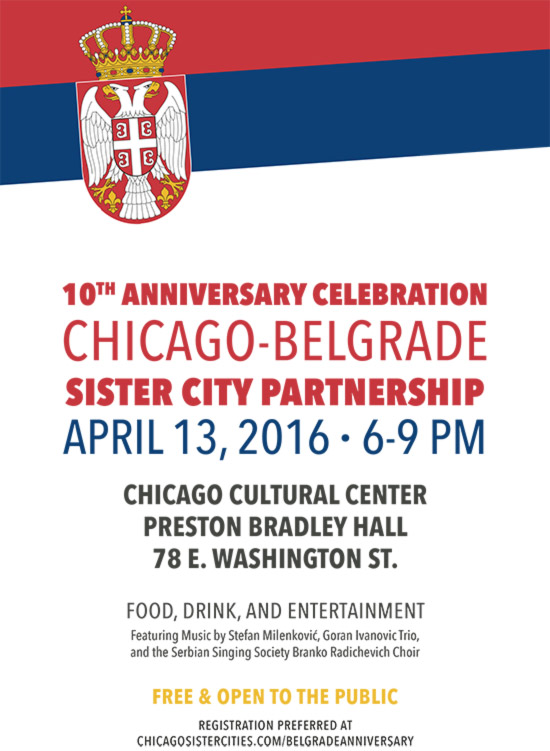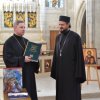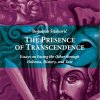Sidebar
Site Map
A great man is one who collects knowledge the way a bee collects honey and uses it to help people overcome the difficulties they endure - hunger, ignorance and disease!
- Nikola Tesla
Remember, remember always, that all of us, and you and I especially, are descended from immigrants and revolutionists.
- Franklin Roosevelt
While their territory has been devastated and their homes despoiled, the spirit of the Serbian people has not been broken.
- Woodrow Wilson
Former GOP senator and Ohio Governor George Voinovich dies
Voinovich, considered a moderate who opposed the size of former President George W. Bush’s tax cuts and later questioned Bush’s war strategy in Iraq, died peacefully in his sleep, his wife Janet confirmed. His death came as a surprise to friends, who said he seemed strong despite some recent health struggles.
Преминуо Џорџ Војиновић
Супруга Џорџа Војиновића Џенет саопштила је да је он преминуо у сну, јавља АП, а преноси Тајм.
Џорџ Виктор Војиновић је био амерички политичар из Охаја. Рођен је 1936. у Кливленду, као дете оца Србина, пореклом са Кордуна, и мајке Словенке. Био је најстарији од шесторо деце.
Агенција АП наводи да је Војиновић био умерен политичар.
Historic Church of Saint Sava up in Flames After Easter Celebration
[NEW YORK POST] Parishioners watched in horror as a massive 4-alarm fire engulfed a Serbian Orthodox church in Manhattan on Sunday — hours after hundreds celebrated Easter services, authorities said.
“For this to happen on such a holy day, I don’t know what to say,” said Alex Velic, a 31-year-old churchgoer, as enormous fireballs erupted from the shattered windows of the Serbian Orthodox Cathedral of St. Sava on West 25th Street.
“To see it burning like that is such a shock. It’s just so sad,” he said. “I can’t think of the words to express how I’m feeling.”
Крагујевчанка бере успехе у САД
Пролећни концерти симфонијског оркестра „Тампа Беј” са Флориде ове године протичу у знаку наше пијанисткиње Мине Мијовић, која је 2015. проглашена за најбољег младог интерпретатора класичне музике у овој америчкој држави. Новембра прошле године ова двадесетдвогодишња Крагујевчанка победила је на такмичењу у Тампи, у организацији симфонијског оркестра из овог места, који се, пре свега, бави популаризацијом класичне музике међу младима у САД.
Serbian Bishop Maxim Visits the Orthodox School of Theology at Trinity College
Bishop Maxim spoke about the efforts of the Serbian Orthodox Church to preserve its centuries-old monuments and the Christian heritage of Kosovo and Metohija.
Call for nominations for the Miša Djordjević Book Prize
North American Society for Serbian Studies is inviting nominations for the annual Miša Djordjević Book Prize. The prize is awarded annually to a distinguished scholar or student in the area of Serbian studies.
Nominations should be sent to Slobodanka Vladiv-Glover by 15 May 2016: This email address is being protected from spambots. You need JavaScript enabled to view it.
Previous recipients of this award include Charles Simic, the fifteenth Poet Laureate of the United States.
More about the Prize can be found here: http://serbianstudies.org/bookprize.html
The recipient of the 2013 "Mihajlo Misha Djordjevic" Book Award is Radmila Gorup for the collection "After Yugoslavia: The Cultural Spaces of a Vanished Land", Stanford University Press, 2013.
The recipient of the 2012 "Mihajlo Misha Djordjevic" Book Award was Tomislav Z. Longinovic for his book "Vampire Nation: Violence as Cultural Imaginary", Duke University Press, 2012.
The recipient of Mihajlo Misha Djordjevic Book Prize for 2009 is Gregory A. Freeman for his book The Forgotten 500: The Untold Story of the Men Who Risked All for the Greatest Rescue Mission of World War II.
10th Anniversary Celebration Chicago-Belgrade Sister City Partnership

Održan je koncert Aleksandre Denda
Beograđanka Aleksandre Denda sinoć je uz desetočlani bend predstavila svoj autorski album "Dreamer", jedinstvenu kombinaciju akustičnih i elektro elemenata uz primese neo soula, džeza i R&B-a. Kao predstavnica eminentne njujorške organizacije umetnika LeitmotivArts, Aleksandra je prepun klub oduševila kako svojim glasom tako i fantastičnim kompozicijama i tekstovima koji nikoga nisu ostavili ravnodušnim.
Brojna publika, koja je bila mešavina svih generacija i raznih kultura, nije krila oduševljenjue umećem ove velike pevačice, osetivši u njenim pesmama iskrenost i autentičnost, ljubav, lepotu, traganje i unutrašnje prevrate.
Aleksandra Denda je džez i neosoul pevačica i kantautorka koja trenutno živi i stvara u Njujorku. Ova beograđanka već godinama nastupa i snima širom Sjedinjenih Američkih Država, Evrope i Azije. Kao kreator i glas benda Aleksandra Denda Group, neguje zvuke soul-a, džeza, R&B-a ali i note Južne Amerike - brazilijane. Ona je takođe i suosnivač vokalne grupe ROSA, koja je jedina autentično-srpska a capella grupa na američkom kontinentu.







